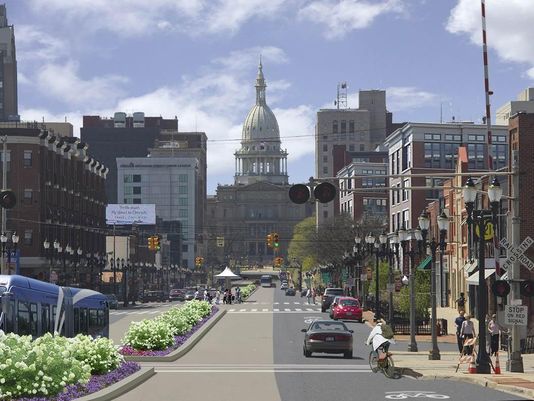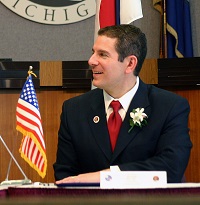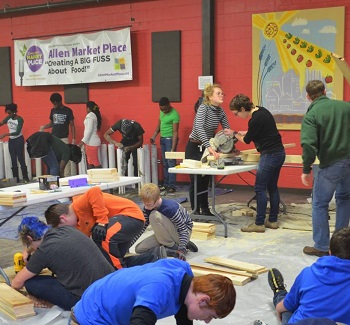NACEDA Executive Director Frank Woodruff sees how government and nonprofits cooperate to increase prosperity – and fun – in Michigan's capital city. This is Frank's last stop in his Goldilocks-themed tour of Michigan.
September 22, 2016
In mid-June I was able to spend five days in South Central Michigan. I grew up a Midwestern boy. Born in Baraboo, WI, in 19(eh), I’m intimately familiar with rich foods, self-deprecating humor, omnipresent smiles, and cow pastures abutting the downtowns of small cities. But Michigan has its own brand of Midwestern charm and distinct flavors to offer your community development palate. I was able to visit three cities during my visit, and I would describe those cities’ flavors the same way Goldilocks described the porridge during her little B&E with the three bears.
Lansing was just about right.
Detroit was Michigan’s original capital city. After the War of 1812, during which Detroit was captured, the State worried about Detroit’s proximity to British-controlled Canada. State officials collected proposals for a new capital city from Jackson, Ann Arbor, and Marshall, among many others. Lansing was not the state’s first choice. Nor its second. Or third. The process of selecting a new capital became so politically contentious, officials chose Lansing because almost no one wanted it there. In fact, the announcement was reportedly met with public laughter.
 |
| Photo by Lansing State Journal |
Today Lansing is home to 115,000 people and is Michigan’s fifth largest city. The greater Lansing area hosts a variety of large public employers including Michigan State Government and Michigan State University. Notable private employers are General Motors’ high tech manufacturing facility and several large insurance companies.
Lansing doesn’t get the attention of Detroit, Flint, or even Grand Rapids. It lacks quality public transportation, as does most of the state, and it lost about 4% of its population (~5000 people) from 2000 – 2010. However, the area’s anchor institutions (government, universities) will keep it economically stable for a generation or more. But predictability can lead to stagnation if left untended. And Lansing’s community development sector knows it.
With only a small market for new housing development, Lansing’s CDCs have a strong preference for rehab and replacement of an aging housing stock, financial counseling, homeownership assistance, and foreclosure prevention, not uncommon strategies for CDCs in the Midwest. But Lansing’s penchant for innovation makes it a fascinating community development case study.
The city is innovative.
Lansing was one of the first five cities provided resources by the Cities for Financial Empowerment (CFE) Fund to create a Financial Empowerment Center, a Bloomberg Philanthropies supported initiative to integrate free, professional financial counseling with existing nonprofit and municipal services. Community-based nonprofit organizations are funded by the city to provide financial counseling services and partner with the city to collocate financial counselors in city service centers. The counselors are physically on-hand to provide strategic client referrals. Outcome measurement is a directive of the program. From 2013-2015, the Lansing Financial Empowerment Center served 2,621 residents, helping them to decrease their debt by $5.3 million and increase savings by $365,000.
 During my time there, Director of the Lansing Office of Financial Empowerment (OFE) Amber Paxton had recently returned from a convening in Philadelphia of all the CFE Fund grantees. Participating cities exchanged ideas and data. Lansing leads its peers in program impact per capita. When asked how Lansing’s OFE is able to outperform its peers, Mayor’s Chief of Staff Randy Hannan, Ms. Paxton, and consultant Megan Kursik (CEDAM), pointed to the commitment of Lansing Mayor Virgil Bernero as the critical factor. Mayor Bernero has made the OFE central to Lansing’s economic development strategy. Amber’s position as OFE Director is part of the mayor’s cabinet. As such, the mayor receives weekly updates and Amber can easily collaborate with other cabinet level peers.
During my time there, Director of the Lansing Office of Financial Empowerment (OFE) Amber Paxton had recently returned from a convening in Philadelphia of all the CFE Fund grantees. Participating cities exchanged ideas and data. Lansing leads its peers in program impact per capita. When asked how Lansing’s OFE is able to outperform its peers, Mayor’s Chief of Staff Randy Hannan, Ms. Paxton, and consultant Megan Kursik (CEDAM), pointed to the commitment of Lansing Mayor Virgil Bernero as the critical factor. Mayor Bernero has made the OFE central to Lansing’s economic development strategy. Amber’s position as OFE Director is part of the mayor’s cabinet. As such, the mayor receives weekly updates and Amber can easily collaborate with other cabinet level peers.
But the city can currently cover just about one third of program costs with its own resources, relying mostly on philanthropic dollars. City officials know private support won’t last forever, so they have begun talks with state officials about rolling out the program statewide, or at least piloting it in a few additional places with state money. State-level talks began this past Spring and will resume when the legislature begins working on the state’s 2018 budget in early 2017.
 On Lansing’s east side, Allen Neighborhood Center is one of the CDCs in the city that does not work directly in housing production. I dropped by unannounced one Thursday morning, thinking I would just catch a peek of their newly purchased facility. Over an hour later, I walked away dizzied by the organization’s array of programs and services. In short, they act as a food hub. They have a farmers’ market, commercial kitchen, a food-related business incubator, and entrepreneurship classes. They put me to work packing carrots for their CSA shipment.
On Lansing’s east side, Allen Neighborhood Center is one of the CDCs in the city that does not work directly in housing production. I dropped by unannounced one Thursday morning, thinking I would just catch a peek of their newly purchased facility. Over an hour later, I walked away dizzied by the organization’s array of programs and services. In short, they act as a food hub. They have a farmers’ market, commercial kitchen, a food-related business incubator, and entrepreneurship classes. They put me to work packing carrots for their CSA shipment.
The organization triages residents for the City of Lansing, directing clients to public services, emergency assistance, and health insurance navigation. A small brewery operates on-site. The organization raises money for the neighborhood pool, and it rents out some extra space to a dance studio. Allen hosts a weekly farmer’s market (even in the winter!) that draws vendors from all over the region. A VERY innovative online exchange connects commercial customers (hospitals, schools, universities) to local farmers otherwise unable to access the commercial food market.
Lansing = Livable
Finally, Lansing is just fun. I’ll admit, I was there in mid-June, the perfect time of year for that famous Michigan summer (I may have a different point of view had I visited in February), and I stayed with a host that went way above and beyond the call of professional hospitality. I stayed into the weekend to catch the Festival of the Moon, an event that raises money for the Old Town Commercial Association. NACEDA Board Member Jamie Schriner-Hooper is also the dutiful board chair of this Main Street organization in one of Lansing’s oldest neighborhoods. As you can see in the picture, being on Old Town’s board comes with about as much glory as being on NACEDA’s.
Local economic development activities include a burgeoning micro-brew scene and a minor league baseball team, the Lansing Lugnuts. I am of course a bookish scholar of economic development and had to experience both.
This city has all the fixin’s. Stable institutional employers. Affordable home prices. No traffic. Walkability. Fall college football afternoons. Beautiful parks. And a warm citizenry that could be (and probably is) the poster-child for Midwestern charm and hospitality.
Thanks for having me guys.
“Lansing. Just about right.” Is the last in a three-part blog series documenting Frank’s time in Michigan in June 2016.
Also in the series:
Part 1 - “Grand Rapids. Hot.”
Part 2 – “Flint. Cold”

